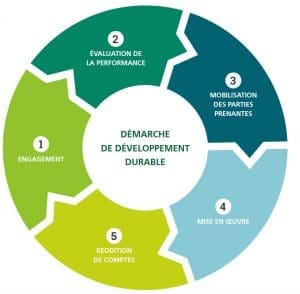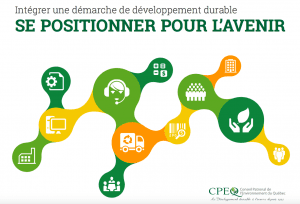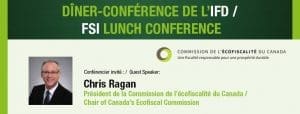We are pleased to announce an important change at EEM in this, the company’s 25th anniversary year. In order to better respond to the needs of our customers and distinct market segments, EEM will become two distinct entities effective July 1, 2018.
Our existing EHS consulting services will continue under the name ÉEM EHS Management Inc. EEM EHS will be directed by three senior members of the EHS team, who will become partners in the company. Véronique Tousignant, Guillaume Carle and Ross Szwec, together have nearly 35 years of experience with the firm. They will carry EEM’s EHS management, compliance consulting and audit business forward, as they have already been doing for several years.
EEM’s founder, Paul MacLean, will continue in a consulting capacity as President of a new entity, EEM Environmental & Social Impact Ltd. The new company will focus on impact assessment and communities work, notably in international markets.
The restructuring of EEM into two entities with distinct ownership is the product of years of successful consulting, and an organic succession plan involving close collaboration within the senior team. It has been designed from within, with the needs of our clients and employees in mind. No jobs have been lost in this process, and we fully expect more jobs to be created as our growth continues in this new configuration. The two firms will continue to be co-located in the same offices, and intend to collaborate on projects going forward.
We are pleased to be able to share this exciting news with our clients, employees and partners, and look forward to continuing shared success together.
Sincerely,
Paul MacLean, Véronique Tousignant, Guillaume Carle and Ross Szwec
This March, the International Organization for Standardization released the new ISO 45001 – Occupational Health and Safety Management Systems standard. This standard, based on OHSAS 18001, aims to ease the constraints for organizations by establishing a framework for:
- improving the safety of workers;
- reducing risks in the workplace and,
- creating better and safer working conditions.
The text, written by a committee of international experts in occupational health and safety, follows the common structure of other management system standards (such as ISO 9001 and ISO 14001). It also takes into account other international standards in this area, such as the International Labor Organization’s (ILO) ILO-OSH guidelines, various national and international labor standards and the ILO’s international labor standards and conventions.
Companies will have a period of three years from the publication of this standard to transition their occupational health and safety management system to the requirements of the occupational health and safety management system. Note that certifications according to OHSAS 18001 will not be renewed.
The transition to a low-carbon economy is the key environmental issue of our time and involves everyone in the company from Corporate Affairs to Operations, including Finance, IT and Human Resources.
Participants are expected to learn about climate change, society’s use of energy, government policy and targets, current and emerging regulations, and the huge challenge that the transition to a low-carbon economy entails, from a technical, economic and societal point of view. We will then discuss how business can use the principles of sustainable development and point to corporate social responsibility action to address the challenge. Lastly, we’ll look at financial incentives and the business case for implementing the transition as well as different approaches and guidelines available.
The objective of the training is to equip business professionals with the tools and information needed to plan for the transition within their organisations. The training is aimed at professionals from all corporate functions who are interested in an overview of the issues and who want the latest information from a variety of perspectives.
The training will take place on January 26th, 2017 at the offices of the CPEQ. It will be given by Stephanie Hamilton, ing., EP (Sustainability), CSR and Sustainable Development Service Leader at EEM. Register on the CPEQ’s website.
Find out more about EEM’s Climate change and low-carbon economy advisory here.
EEM is delighted to have contributed to the update of two new guides from the CPEQ on how business can address sustainability. The first is for SMEs while the second is aimed at larger entreprise.
 The large entreprise version of the guide presents a 5 step approach :
The large entreprise version of the guide presents a 5 step approach :
- Engagement: capturing the drivers and making a business case
- Performance-to-date evaluation: understanding context to inform action-planning
- Stakeholder engagement: mobilising collaboration
- Implementation: Taking action with a prioritized approach
- Reporting: Measure, assess and communicate performance
(EEM’s translation)
Both guides suggest specific actions that can be undertaken by the different functions/departments of an organisation (ex: accounting and finance, real-estate management, research and development, etc.). As stated in the guide:
While it is important to consider what can be achieved in each and every function of an organization, a sustainability implementation plan starts by identifying the sustainability issues that are most material, where significant and achievable action can be taken by the business. It is therefore possible to start in any department and then come back to a more holistic approach (EEM’s translation)
 The guides have been published as interactive PDF documents. They can be read in the order proposed, or the reader can stop to explore an idea further by looking into the embedded complementary information (definitions, in-depth briefings, case studies, etc).
The guides have been published as interactive PDF documents. They can be read in the order proposed, or the reader can stop to explore an idea further by looking into the embedded complementary information (definitions, in-depth briefings, case studies, etc).
Stephanie Hamilton, EEM’s service lead on CSR and sustainable development, has been an active participant on the sub-committee for the revision of the guide since the start of the collaboration. EEM also contributed financially to the graphic design of the guide for larger entreprise.
The two guides are now available for free download from the CPEQ website (in French). For optimal viewing, open the downloaded copy with Acrobat reader.
On November 2nd, the Global Reporting Initiative (GRI) released their new reporting standards. The evolution from being guidelines with iterative versions (we were at version G4) to being a more succinct modular standard with specific reporting requirements for material topics is explained in this short video published by the GRI.

EEM was retained by the CBG to conduct a Biodiversity Management System (BMS) to refine risks, to minimize them, to implement actions for a no net loss of biodiversity and to ensure effective and independent monitoring. This also implies involving all stakeholders and facilitating the participation of local populations and organizations through consultations. EEM’s strategy was for a BMS document produced gradually over the length of the BMS and reviewed by CBG and external reviewers gradually. This has allowed time for adjustments and changes. However, the end goal to produce a single freestanding report that included the updated assessment, the overall approach and implementation details was achieved within timeline in 2015. Read the case study.
 ÉEM is proud to be co-sponscoring the IFD-FSI’s lunchtime conference with Chris Ragan of Canada’s Ecofiscal Commission. Attuned to the interests of investors, Chris’ presentation is entitled: Investing in an Ecofiscal Policy World: The Impacts and Opportunities of Putting a Price on Carbon. Click here for the IFD-FSI Invitation.
ÉEM is proud to be co-sponscoring the IFD-FSI’s lunchtime conference with Chris Ragan of Canada’s Ecofiscal Commission. Attuned to the interests of investors, Chris’ presentation is entitled: Investing in an Ecofiscal Policy World: The Impacts and Opportunities of Putting a Price on Carbon. Click here for the IFD-FSI Invitation.
The Finance and Sustainability Initiative (IFD-FSI) is a non-profit organization that brings together finance professionals dedicated to promoting sustainable finance and, more specifically, responsible investment to financial institutions, companies, and universities.
ÉEM’s CSR and Sustainable Development practice includes a special advisory on climate-related risks and how companies can best prepare. Contact Stephanie Hamilton for further information.

EEM has co-created an Eco Canada event in Montreal on November 22nd, 2016: a stimulating and informative day for Environmental Professionals on our inescapable transition to a low carbon economy. Click here for the full details. Contact us for our promo code for a $125 discount (stephanie@eem.ca).
EEM coordinated a pilot project in an aircraft engine manufacturing facility to replace disposable shop towels by reusable shop towels. The project was aligned with the company’s goal of eliminating all waste by 2028. Following the success of the pilot project, it was implemented to the remaining sectors of the facility. Read the case study.
Company description
EEM is a sustainable management consultancy that provides expertise to public, private and nonprofit sector organizations in the following service areas: Environment, Health and Safety, Impact Assessment, Communities, and CSR Strategy. For over twenty years, EEM has helped customers incorporate sustainable development principles into their business by bridging the gap between strategic planning and implementation of operational solutions.
EEM currently has a vacancy for a consultant in social impact assessment.
Job responsibilities:
Provide consulting services in social impact assessment (SIA) and manage the SIA process including:
– Manage third party contractors who will perform relevant studies and investigations for the SIA process.
– Ensure compliance of studies and management plans with local and international standards, including Canadian Federal and Provincial regulations and International Finance Corporation’s (IFC) Performance Standards for international SIA’s.
– Research of existing databases and data collection for specific projects.
– Conduct community consultations as part of the SIA process.
– Oversee preparation of the impact assessment report and participate by drafting technical reports, analyzing project direct, indirect and cumulative impacts and drafting social management plans.
– Assist in client contact and communications pertaining to specific projects.
Job requirements:
Essential: Bilingual – French and English (spoken and written) – The candidate should be fluent in both languages.
Essential: Minimum 5 years’ experience in social impact assessment and in delivering SIA mandates compliant to IFC Standards.
Important: Ability to deal directly with clients, team members and regulatory agencies.
Important: Project management competencies (cost management, time management, client management, etc.).
Important: Ability to work both in a team and independently, with minimal supervision.
Asset: Experience on social impact assessment of projects in West Africa and abroad.
Mobility: International travel (maximum 3 weeks at a time), according to customer needs.
Additional information: EEM offers a competitive compensation package and a flexible work environment where accomplishments and contributions to the firm’s objectives are rewarded.
Start date: August 2016.
To apply: Send your resume by email to Véronique Tousignant (veronique@eem.ca).